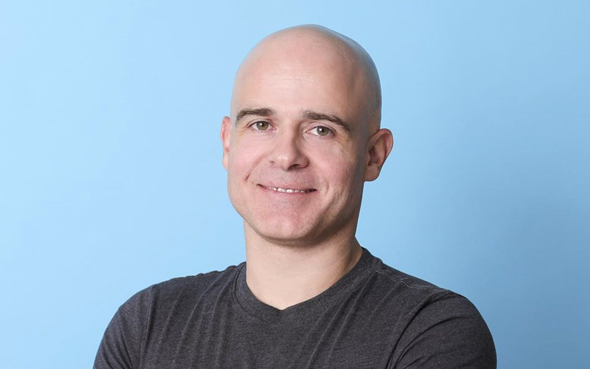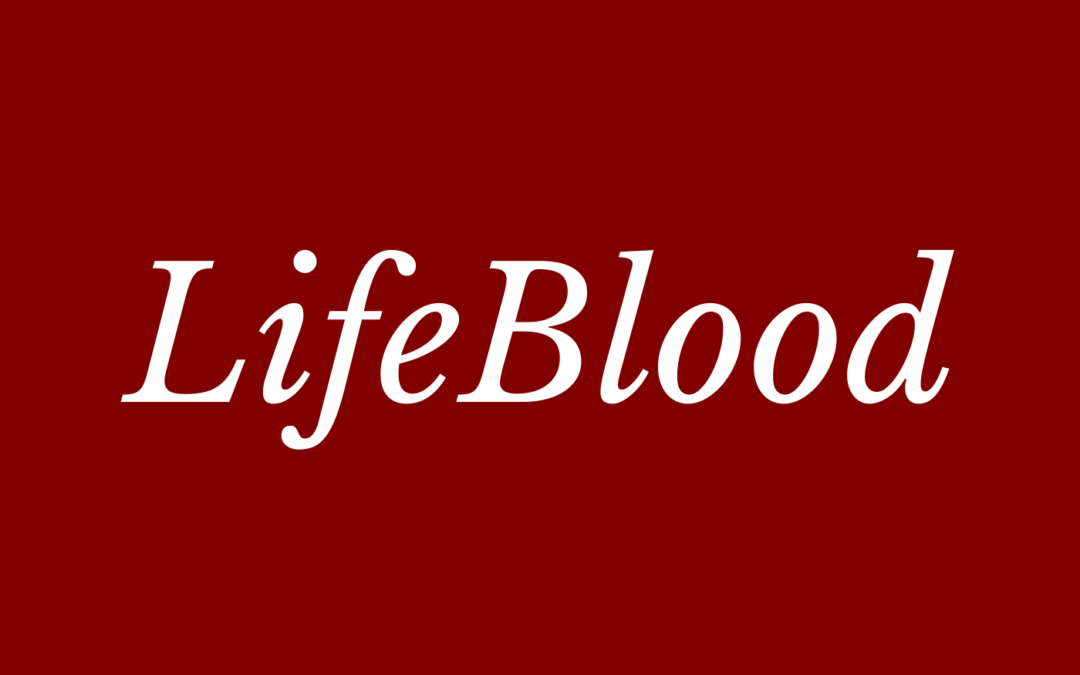Creator Economy with Zeev Farbman
How many people are using social media for fun versus a commercial enterprise? Zeev Farbman talks about creating the tools for helping people express themselves online!
Listen to us On
About the Episode
LifeBlood: We talked about the creator economy, thinking about and developing tools for people to express themselves, growing a company on the cutting edge of technology, and how to balance time on existing versus new projects with Zeeb Farbman, CoFounder and CEO of Lightricks.
Listen to learn the percentages of people who are using social media for fun versus commercial enterprises!
You can learn more about Zeev at LightTricks.com, Facebook, Twitter, Instagram, YouTube and LinkedIn.
Thanks, as always for listening! If you got some value and enjoyed the show, please leave us a review wherever you listen and subscribe as well.
You can learn more about us at LifeBlood.Live, Twitter, LinkedIn, Instagram, YouTube and Facebook or you’d like to be a guest on the show, contact us at contact@LifeBlood.Live.

George Grombacher
Lifeblood Host

Zeev Farbman
Guest
Episode Transcript
george grombacher 0:00
Come on life blood This is George G and the time is right welcome today’s guest strong to powerful Zeb Farben, Zeb, are you ready to do this? Let’s go. Let’s go, though is the co founder and CEO of light tricks, they are award winning app company helping brands and creatives discover new ways to express themselves say to have you on step tell us a little about your personal life some more about your work and why you do what you do.
Zeev Farbman 0:42
So it’s great excited to be here is so before light tricks I spent a decade in academia, most of my research was somewhere on the border between computer graphics, image processing and computer vision. And towards the end of my PhD, a mobile kind of rushed into real life. And with my co founders, we have like this thesis that at some point, people will realize that the moment is a great platform not only for content consumption, but also for content creation. And we basically wanted to be that company that provides the most kind of sophisticated, powerful tools for people to create content, photos, videos, music, etc. And Bacon today, it’s actually was a controversial thesis that many people thought that mobile is a great platform for social media networks for gaming, maybe, but not so much for consecration, they are actually but with time, people will be able to express themselves to do really cool things on mobile. And in the beginning, we actually thought to do it as an academic project, we actually wanted to create some kind of a cool for editing app, while being in the academia. But that didn’t work out. So together with a group of friends, we decided to create play tricks and to try and help creators across the world to express themselves in magical ways. And that’s what we’re doing since then, like as to why well, when we start it, we just felt that there’s like this sense of opportunity to do something cool more well, to create the company that doesn’t exist yet. It was like felt like this, like we were a bootstrap company. We didn’t raise any money, we kind of started. Without any financial backing. It’s felt like this kind of unique moment in time where you want to kind of explore something new with your friends, to embark on a new journey to be financially successful. And all these things happen. So these days, it’s just like being on this roller coaster of a startup existence and trying to get the best experience out of it.
george grombacher 2:56
Nice. I certainly appreciate all of that. And how long have you been at it with light tricks now?
Zeev Farbman 3:03
So we left the Kadima in 2012, officially incorporated in 2014. So by now it’s been more than eight years. Time flies, huh? It’s so
george grombacher 3:16
nice. Well, that is that is. I don’t want to call it quite a departure. But I don’t necessarily think of academics as as entrepreneurs, and certainly a bit of a it’s a massive risk to become an entrepreneur. But then not only that, to become an entrepreneur in a space, which didn’t really exist.
Zeev Farbman 3:39
Well, it’s true. When we kind of decided to depart from academia I made where to steer in the computer science department of Hebrew University of Jerusalem about people thought what we’re basically crazy is kind of putting our academic career on hold, but we actually had some really nice role models here in Israel already. So one of the faculty members of Hebrew U Professor Amnon shashua, by Viano, regular co founded Mobileye, which became with timelike really successful public company and then into acquired them for $15 billion. So we really have like this role models of people who started in the Kadima and then created like, really successful companies. So for us, it definitely fell like it’s doable. Kind of initial attempts at creating content creation tools on mobile. And while this was really, really cool, we kind of believe that we can do better. And that’s a guess what gave us the confidence to try and in terms of not being an established market, we almost saw it like a bonus. It allows us to start small being very agile not to raise any money move kind of quickly forward. And again, like give you an example when we created our first step face tune it’s mobile photoshop app. expectation from this app were to hopefully get $100,000 in revenue in order to embark on even bigger project. Like we couldn’t. I mean, if someone told us that at some point down the line, Facebook is gonna surpass 100 million dollars in annual revenues, we definitely wouldn’t believe that. Right. But again, for us, while it was the risk, we just like felt it’s exciting opportunity, new thing that doesn’t exist. So yeah, we decided to do it. Nice.
george grombacher 5:30
I appreciate that. And you mentioned partners, how many? How many partners? Do you have? Or did you have a no do you have,
Zeev Farbman 5:38
we have a D, co founding team of five people think it’s an unusual setup. And all of the co founders of Lightroom are still on the board of the company, one of us decided to start his own venture fund. So he’s already on the finance side of things. The other four are still operationally involved in the company.
george grombacher 6:05
Nice. There are probably a ton of lessons and tons of podcast just then successfully working with that many other people. Do you have a big takeaway there? Or or advice to other would be founders?
Zeev Farbman 6:22
Yeah, for sure. It’s actually easy. I mean, there, there are certain questions that people ask you that change over time, right? So if you ask me why I’m doing what I’m doing my answer now and eight years ago would definitely be different. But in terms of advice for potential intrapreneurs, with respect to co founders, it is still the same thing, you need to realize that you’re basically getting yourself into the topic of marriage. It might be easier these days to dissolve that kind of marriage, and your startup relationships. So you should be super careful. And you know, in the beginning, many people actually focus on the downside of intrapreneurial journey exciting, I don’t know, like, percentage of the startups that fail, etc. But sometimes you also need to ask yourself, well, what happens if they actually succeed, and then it’s not a two, three year journey, it’s a 10 year journey, or maybe it’s a 20 year return, right? And then you realize that you’re going to see these people every day for many, many years, and you’re going to spend more time with them and your family, their spouse, etc. So that’s a really big consideration you to make sure that you both really respect these people in terms of their capabilities, and you just enjoy spending time with them. Because, again, if it’s not there, you’re gonna suffer to a degree, it’s gonna be less fun, and it’s gonna impact your resilience over time.
george grombacher 7:52
Yeah, for sure. And you, I think that you have a computer science background, and you were a computer scientist, how is that changed? As CEO?
Zeev Farbman 8:07
This is one of these painful points for at some point, you kind of trying to keep writing some code. And kind of inside the company, no one is bold enough to tell you Oh, come on, stop trying to contribute your show, just to create bottlenecks for everyone around and an investor started to ask, well, how you’re spending your time and then you’re kind of trying to show that you’re still a builder, and that you’re like committing some code, and they’re kind of looking at you like, listens, pretty sure it’s the best use of your time, etc. So I kind of try to help you. With hands on projects, I think until 2018, it was so kind of six, seven years in and after that, it became clear to me that I’m really just bottleneck and there are people across the company that are way more qualified to doing single contributors work. So I stopped, I had no a transition period that was colored with a little bit of melancholy around feeling that the certain parts of my brain are becoming extremely rusty and they have nothing to do in order to change that. With some point, they realize that there’s a lot of fun to be had across our domains, the front of the company that’s trying to focus these days.
george grombacher 9:36
Got it different seasons of life in business, so exactly that. Got it nice. All right. So y’all light tricks are making these incredible apps and programs that make it possible for people to express themselves in ways that didn’t realize were even possible and new and exciting things. How how how do you think about innovating and, and finding new product projects versus keeping the great stuff that you have going?
Zeev Farbman 10:10
So internally, we have like this framework to one of the co founders near a kind of basically got from his PhD studies, he was doing most of his research around machine learning and multi engine systems, like this framework was called exploration versus exploitation. And it can help something originally had something to do around like how much time you’re getting kind of a certain branch of your kind of exploration as an algorithm to go in a certain direction before you kind of move to other directions, etc. So we kind of realize that in order to both innovate and protect the core business, you need to do both of these activities, right. So again, like roughly 70 80% of the time you’re gonna work on, keep the current business running, there is no other way around the right way, a significant scale of revenues, and we have a lot of users, we have a lot of paying users more than 5 million subscribers, right? Like these people expect certain features. So you need to deliver kind of value with kind of people expect for you that we’re putting under like this bucket of exploitation right? Here we can you already have an existing business, it needs to keep running. That said, we constantly realize that in order to create, like these breakthrough moments, you need to invest time in exploratory activities. And it takes internally here, I would say, two main forms. One, really, we’re having like this concept of temporary people are working on something that’s not related to the immediate task, right? It could be training projects, where you’re just like learning something new that you expect, is gonna read on to what you’re doing at some time. It can be a project with a different team, where you’re bringing new ideas. But that’s the creative valuable, in my opinion, to kind of put people in this exploratory mode. And another bucket of activities is basically have a kind of big research team across the company, right? So we have, I think, relative to our size, the really big kind of research team. And so we are a company of like roughly 500 people and our research team, meaning people that focus on exploring technological breakthroughs, and figuring out how they can be relevant to a new generation of tools, we have almost 40 people that are working on these things. And that’s a word like, for a startup of our side, I think it’s kind of unprecedented. So that’s our way of tackling innovation is clearly realizing that you need to allocate a budget, okay, can have a clear time budget for these activities.
george grombacher 12:57
Nice. Yeah, that’s, that’s certainly makes sense. And I always appreciate people have a framework and 500 people in 40 working on on developing the new tools for that’s that’s that is very, very exciting.
Zeev Farbman 13:13
Exactly new tools. It’s something even more exploratory that right there. A kind of looking into the latest technologies in computer graphics, machine learning, image processing, and it’s not immediately clear sometimes what is the applicability of these technologies to tools, right, so, but they still kind of work on the scenes, they start to play with the scenes get some intuition around how it can be helpful for product people start to collaborate with product people basically showing them prototypes and asking the reason, do you kind of think that you have something to do this thing? So it’s kind of really exploratory, obviously, a ton of these things do not see the light of day. But so far, we weren’t able to figure out how you can innovate?
george grombacher 14:00
Yeah, I appreciate that. So what what is the experience you hope people have when when they come across like tricks or, and they they look at using some some some of your apps or products.
Zeev Farbman 14:16
Since we started the company, we’re always like, really valued fun, okay, meaning both internally, we want to enjoy what we’re doing and externally. So we want to create an experience that when the user uses the tool, it feels magical. But also it feels like the user is doing something like it’s a creative process where you’re having like this cool aha moments where you realize, oh, I can could have created something cool. So typically, we’re gonna try to we’re typically trying to avoid from the completely automatic solutions, right? We’re just, you know, tapping on the button, something happens and you have no control over that, right. We’ve preferred to have something that you know, that has a ton of technology. Under the hood that kind of facilitate a lot of friction points that exist in the professional software by removing, again, like degrees of control that we do not feel that are useful for, you know, vast majority of users, but still retain a degree of control where we both kind of feeling that there is no ton of friction, but you’re still in control. And then really, really looking for this kind of cool moments where the users like, oh, I kind of figure it out. It’s cool and kind of really feels mine, right. Like, again, imagine Instagram filter back in the day, it was like this one click interaction, again, it’s okay for most people, but people who are coming to use our tools are looking for something beyond that, right. And in order to kind of make them approve to appreciate the experience, like we need to create like this magic that comes from reducing friction, but still having fun and still having control over the process.
george grombacher 15:55
That’s really does make sense. Because it’s supposed to be fun, after all.
Zeev Farbman 16:00
That’s exactly that’s where it started. I mean, it’s it’s hard to a be a company that creates cool stuff for creative people without having foreign territory. Again, when once you’re exploring theme we mentioned exploration before, you need to have fun, that’s like really part.
george grombacher 16:21
Yeah, it’s interesting. And as those words left my mouth, I realized that there’s probably a lot of folks who use your tools who are doing it for fun, yes, but this is also now their business. And this is their livelihood. And so as obviously, the reason that you have so many people making sure that things work the way that they want to, or they need to, but you say that they’re going to is because people are depending on you for for their work.
Zeev Farbman 16:45
ethic. For us, it was a really big kind of shift in the mindset that happened recently. A extra like we realize that this shift in the mindset of our users happened that would say over the course of the last two years, like two three years ago, when we’re asking your users, what are you using the apps for 75% of them would answer that it’s actually a creative hobby, something that they do in order to share like social media with friends and family. But most of them didn’t come to our apps with some commercial intent in mind. These days, it’s completely flipped, right? Only 25% of users are coming to our tools for a few foreigners will be, and 75% 75% of them are coming with a commercial intent. And what actually happened is that our Creator start to realize that the content that they create, the typically goes to major social media platforms, is the engagement driver of this platforms, right? So they actually start to realize, well, the fact that tick tock is so successful as a platform is because we are creating like these cool videos. And they start to realize, well, that gives us power, and we need to figure out how to leverage that. So these days, we’re actually trying to figure out how we’re helping our users not only to create a cool content, but also how to grow their audience, how to monetize, etc. And that’s also kind of really exciting, right? When you’re seeing your users being able to create a kind of major source of income from something that searches their hobby. That’s also pretty cool.
george grombacher 18:21
What an incredible shift. That’s amazing. Do you think that the pandemic really sort of catalyze that? Or would that have happened anyway?
Zeev Farbman 18:33
I think it will happen anyway. But pandemic was definitely a catalyst letter, like for sure. We like saw it in the numbers of downloads, etc. And thinking yeah, it’s like really facilitated some of the trends that already happened, I don’t know when we look at the media consumption is kind of clear that there are like this big trance of transition to a short form of video format, right? And all this Tiktok phenomena, etc. And once people consume more media this way, it kind of like this flywheel that attract creators and at some point, they realize, oh, we created a falling game the can something below this. So yeah, that’s basically when people talk about creators economy. It’s like this huge, like this huge password basically by now and everyone sees something different there. For us creators economy is exactly that. It’s like this shift in the mindset of for users that realize that the fact that they create cool and engagement content for major social media platforms, gives him a lot of leverage, and they can create something meaningful out of it, not only a hobby, but something that’s going to be internal parts of their life, something that we will they will be able to monetize. And that’s really cool. We’re like super excited.
george grombacher 19:57
It’s incredible. What’s up? appreciate it thank you so much for coming on where can people learn more about you and light tricks?
Zeev Farbman 20:07
Thank you very much for having me.
george grombacher 20:09
And how how can people engage with you and and where can they find light tricks?
Zeev Farbman 20:15
Well, we’re emits a huge talent war across the high tech industries. So we are hiring heavily to a ton of positions across the world. So some of your listeners interesting to take part of helping creators to be successful in their journey we are open for business.
george grombacher 20:41
Excellent. And if people are interested, what is the website or how can they find you?
Zeev Farbman 20:48
So light trees.com
george grombacher 20:51
Excellent. Well, if you enjoyed this as much as I did shows of your appreciation and shared today show the free to also appreciates good ideas, go to light tricks, calm and check out all the great stuff that they’re working on. And there’s an opportunity for you to join this growing team will definitely check that out as well. Thanks, kids up. And until next time, keep fighting the good fight. We’re all in this together.
Transcribed by https://otter.ai
More Episodes
Beyond the Bank Balance: Cultivating a Soulful Relationship with Money
You don’t need to be a Wall Street shark or a personal finance guru to develop a healthy relationship with money. In fact, most of us start with little more than a jumble of beliefs and habits passed down from our families. But if you’ve ever found yourself stressed...
How Using AI Can Help You Gain Clarity Into Your Financial Future
In today's fast-paced, data-driven world, achieving financial clarity can feel like an overwhelming task. With numerous financial decisions to make—from budgeting and investing to retirement planning and debt management—it's easy to feel lost in the complexity of it...
How AI Can Help Improve Your Personal Finances
1. Smarter Budgeting and Expense Tracking AI-powered tools like Mint, You Need a Budget (YNAB), and PocketGuard can automatically categorize your expenses, track your spending in real time, and even alert you when you’re about to exceed your budget. These tools...
Trust and Confidentiality When Using AI as Your Financial Coach: Safeguarding Your Sensitive Data
In the digital age, artificial intelligence (AI) has revolutionized many aspects of our lives, including personal finance. AI-powered financial tools have become a go-to resource for budgeting, investing, debt management, and even retirement planning. But as more...
How AI Can Be Your Personal Financial Coach: Unlocking the Future of Financial Success
In today’s fast-paced world, managing your finances can feel overwhelming. With so many options for saving, investing, and budgeting, it can be hard to know where to start or how to stay on track. Fortunately, advances in technology—specifically Artificial...
How Technology and AI Are Benefiting Investors and Consumers in Securing Their Personal Financial Futures
In recent years, the rise of technology and Artificial Intelligence (AI) has profoundly transformed the financial landscape. These advancements have empowered investors and consumers to make more informed, efficient, and personalized decisions about their financial...
10 Things New Parents Should Be Thinking About Regarding Their Personal Finances
Becoming a parent is one of the most joyful and transformative experiences in life. However, it also brings new financial responsibilities and challenges. If you’re a new parent or expecting, it’s crucial to plan ahead to ensure your family’s financial security. Here...
10 Things Newlyweds Should Be Thinking About Regarding Their Personal Finances
Marriage marks a new chapter filled with excitement and partnership. While love may be the foundation, financial harmony is key to building a stable and happy life together. To set yourselves up for success, here are 10 essential financial topics that every newlywed...
Financial Tips for New Parents: Building Stability and Security for Your Growing Family
Becoming a parent is one of life’s most rewarding experiences, but it also brings significant financial challenges. From diapers to daycare, the costs add up quickly. Whether you’re a first-time parent or adding to your family, managing finances wisely is crucial for...
Join the show.
Interested in being on the show? Tell me a little bit more about you and what you’d like to talk about!














